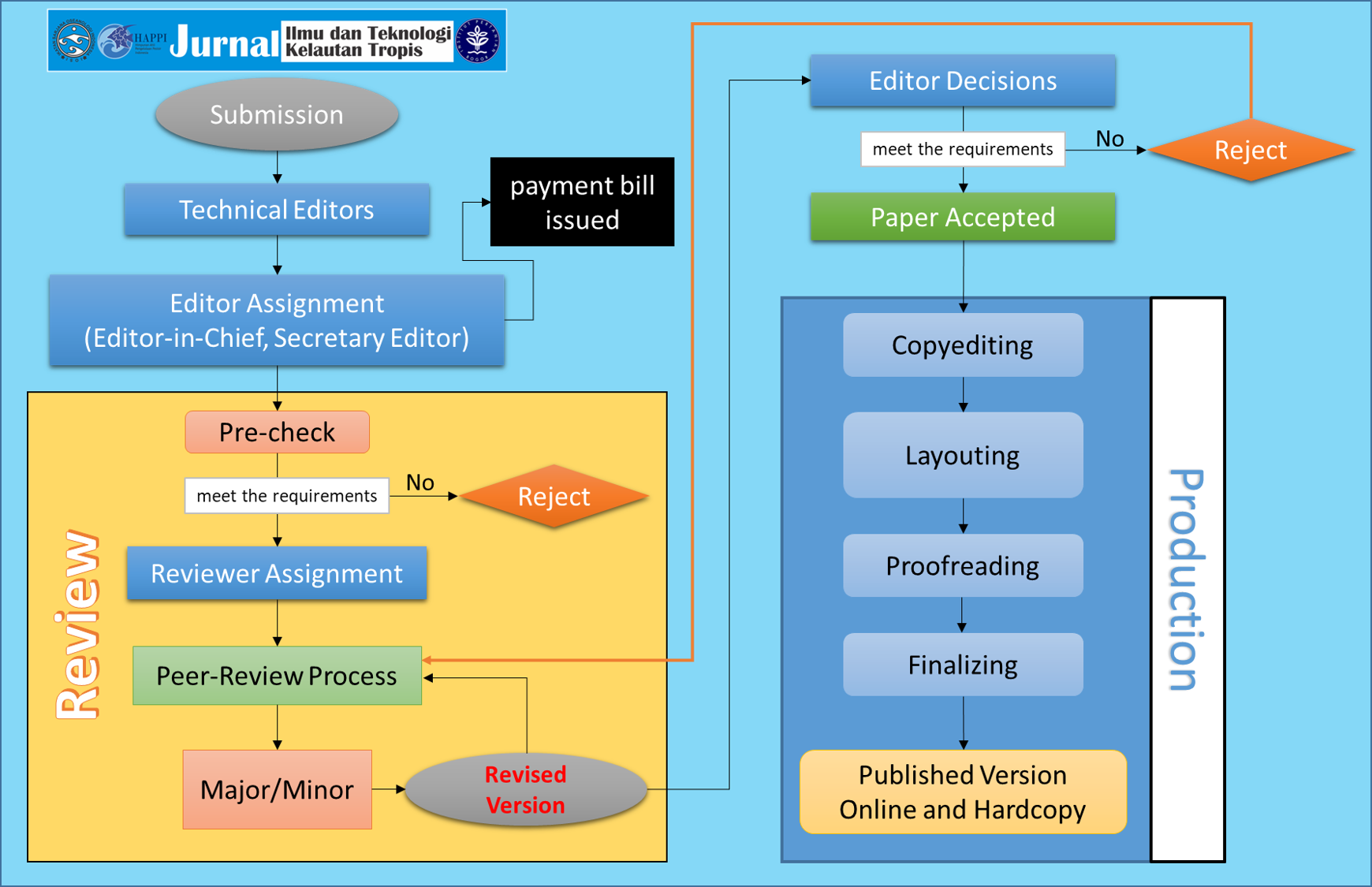About the Journal
Jurnal Ilmu dan Teknologi Kelautan Tropis (JITKT) operates a rigorous peer-review process with several stages (as below) and followed by a final acceptance/rejection decision by the Chief Editor or another editor in Editorial Board Member approved by the Chief Editor.
Pre-check
Immediately after submission, this check is initially carried out by the technical editor to assess:
- Suitability of the manuscript to the journal according to the aims and scope;
- Qualification and background of authors;
- Plagiarism check;
- Reject poor manuscripts.
The Chief Editor, or the Secretary Editor, or an Editorial Board Member in case of a conflict of interest, will be notified of the submission and invited to check and recommend reviewers.
Peer-review
The process is double-blind peer-review, meaning that the author does not know the identity of the reviewer, and the reviewer does not know the integrity of the author. At least two review reports are collected for each submitted article. The Editor-in-Chief can make suggestions of reviewers during pre-check. Alternatively, JITKT editorial staff will use qualified Editorial Board Members, qualified reviewers from our database.
The following checks are applied to all reviewers:
- That they hold no conflicts of interest with the authors,
- They must have recent publications in the field of the submitted paper;
- They have not recently been invited to review a manuscript for any JITKT accepted paper.
To assist Editorial Board Members, JITKT Technical Editor handle all communication with reviewers, authors, and the external editor; however, Editor-in-Chief and Editor Secretary can check the status of manuscripts and the identity of reviewers at any time. Reviewers are given four weeks to write their review. For the review of a revised manuscript, reviewers are asked to provide their report within one week. In both cases, extensions can be granted on request.
A paper can only be accepted for publication by Editor-in-Chief or Editor Secretary. Employed JITKT staff (Technical Editor) can only reject papers: it would create an apparent conflict of interest if they were permitted to accept an article as their salary is paid for by the article processing charge of accepted items.
Editor Decision
When making an editorial decision, we expect that the Chief Editor-in checks the following:
- The suitability of selected reviewers;
- Adequacy of reviewer comments and author response;
- Overall scientific quality of the article
The technical editor can select from: accept, reject, ask the author for revision, ask for an additional reviewer. If there is any suspicion that a paper may contain plagiarism, the editorial office will check using the industry-standard iThenticate software for similarity check. Reviewers make recommendations, and Editors-in-Chief are free to disagree with their views. If they do so, they should justify their decision for the benefit of the authors.
Revision
In cases where only minor revisions are recommended, the author is usually requested to revise the paper before referring back to the editor. Articles may or may not be sent to reviewers after author revision, depending on whether the reviewer requested the revised version and the wishes of the editor. Apart from exceptional circumstances, we allow a maximum of two rounds of major/significant revision per manuscript.
JITKT Editorial Flowchart (Download)
Production
JITKT carries out production on all manuscripts, including language editing, copy editing, and conversion to XML and PDF. Language editing is carried out by professional English editing staff and Bahasa Indonesia editing staff. The authors are also free to use other English or Bahasa Indonesia editing services or consult a native English-speaking colleague-the latter being our preferred option.
The Role of the Chief Editor
The Chief Editor is responsible for the Editorial Board and Technical Editor's quality of the publication process; this includes making final decisions on manuscripts or approving scholars to whom the decision can be delegated. The Editor-in-Chief also supports new Editorial Board members.
(Revisied Edition 2020)

